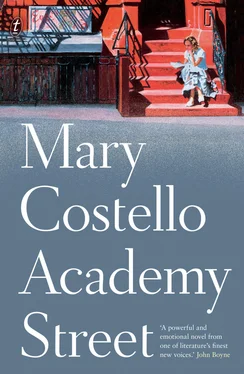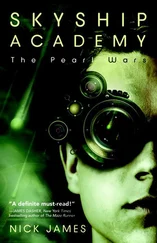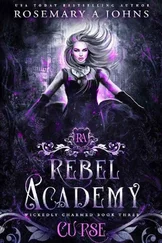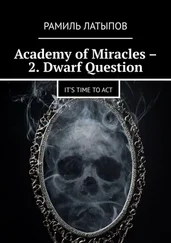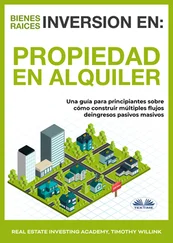Mary Costello - Academy Street
Здесь есть возможность читать онлайн «Mary Costello - Academy Street» весь текст электронной книги совершенно бесплатно (целиком полную версию без сокращений). В некоторых случаях можно слушать аудио, скачать через торрент в формате fb2 и присутствует краткое содержание. Год выпуска: 2014, Издательство: Text Publishing Company, Жанр: Современная проза, на английском языке. Описание произведения, (предисловие) а так же отзывы посетителей доступны на портале библиотеки ЛибКат.
- Название:Academy Street
- Автор:
- Издательство:Text Publishing Company
- Жанр:
- Год:2014
- ISBN:нет данных
- Рейтинг книги:3 / 5. Голосов: 1
-
Избранное:Добавить в избранное
- Отзывы:
-
Ваша оценка:
- 60
- 1
- 2
- 3
- 4
- 5
Academy Street: краткое содержание, описание и аннотация
Предлагаем к чтению аннотацию, описание, краткое содержание или предисловие (зависит от того, что написал сам автор книги «Academy Street»). Если вы не нашли необходимую информацию о книге — напишите в комментариях, мы постараемся отыскать её.
J.M. Coetzee
Academy Street This is an intimate story about unexpected gifts and unbearable losses, and the perpetual ache for belonging. It is exquisitely written and profoundly moving.
Academy Street — читать онлайн бесплатно полную книгу (весь текст) целиком
Ниже представлен текст книги, разбитый по страницам. Система сохранения места последней прочитанной страницы, позволяет с удобством читать онлайн бесплатно книгу «Academy Street», без необходимости каждый раз заново искать на чём Вы остановились. Поставьте закладку, и сможете в любой момент перейти на страницу, на которой закончили чтение.
Интервал:
Закладка:
She stopped outside the church, its great wooden doors locked. Its stone walls hinted at further silence and sympathy within. And then the night stood still and she looked up at the stars. A serene peace entered her, and her heart lifted and it came to her with the clarity of a vision: Theo had love. He was in love, and loved, and beloved. He was understood. And in the better part of herself she knew this was all that mattered.
In the better part of herself. Had she not glimpsed beauty? Had she not, at times, felt blessed? Had she not felt the surge and soar of love, the glint of grace and, once, had not the planets collided, and had she not burned with passion? Love had existed, she had felt its throb, its inner vibration. Even if, on that night, their carnal bodies had not bestowed beauty on the act itself. But it had existed. Had not a child come out of it and been delivered fully fledged to the world? Images from the past returned to her: entering Willa’s apartment in the evenings, the child running into her arms, making her heart leap in her breast. To give joy like that. To see him sitting in his bath, eyes closed, laughing, as she rinsed his hair and the warm water trickled down his face. Or lying on the floor drawing men on the moon, animals marching in pairs onto Noah’s Ark, asking her to spell a word, and she, she, in the wash of him, feeling the truth of him deep in her soul.
She walked on home. She moved with divine calm, as if all the world were sleeping. She remembered a line from a book: For the beautiful word begets the beautiful deed , and felt vast, deep, complete.
PART THREE
14
OVER THE YEARS, over long winter nights and summer afternoons, Tess found a new life in books. As if possessed of a homing instinct she would often leave her hand on a title on a library shelf or in a book bin outside a bookstore that somehow magically fitted her at that moment. The mere sighting of a book on her hall table or night stand as she walked by, the author’s name or title on the spine, the remembrance of the character — his trials, his adversity — took her out of ordinary time and induced in her an intensity of feeling, a sense of union with that writer. Another vocation, then, reading, akin, even, to falling in love, she thought, stirring, as it did, the kind of strong emotions and extreme feelings she desired, feelings of innocence and longing that returned her to those vaguely perfect states she had experienced as a child. She was of the mind now that this evocation, this kind of dream-living was sufficient, and perhaps, in its perfection, preferable to the feeble hopes embedded in reality.
The things she had hankered after — encounters with beauty, love, sometimes the numinous — she found in books. She flinched from the ugly, the vulgar, but never from suffering or the pain of shame, discerning in the author’s soul a striving to transcend these states, to draw out of injury or anguish some revelation, some insight, that would deliver both character and reader into a new state of grace. She suffered for the characters, for the authors too. She lived in a divided world, the inner at a remove from the outer other. It was this inner alter-life that rendered her outer life significant and in which she felt most exquisitely contained. She became herself, her most true self, in those hours among books. I am made for this, she thought. In the shade of a tree a bird would call and she would lift her head from her novel, arrested, heart-weakened. Then she would remove her glasses and come to, up out of a trance and into the world where joggers and school children and old couples linking arms drifted in shade and mottled light, a world that newly bedazzled her.
It was not that she found in novels answers or consolations but a degree of fellow-feeling that she had not encountered elsewhere, one which left her feeling less alone. Or more strongly alone, as if something of herself — her solitary self — was at hand, waiting to be incarnated. The thought that once, someone — a stranger writing at a desk — had known what she knew, and had felt what she felt in her living heart, affirmed and fortified her. He is like me, she thought. He shares my sensations.
There did not seem to be enough hours or days or years left in her life to read all she wanted to read. She moved about the world with gratitude, porous to beauty and truth. At Mass she felt a new appreciation for the Scriptures, the Gospels, the sounds of the Psalms. She went to certain Masses, certain churches, for the music alone, to be exalted. She attended recitals, listened to radio concerts. It was as if she had undergone a tenderising of the heart, a refinement of the soul, with everything reaching her at a pure and distinct register.
She went to dinner occasionally, and to concerts, with Willa or Priscilla. Theo and Jennifer took her out for her birthday and at other random times. Two years into their marriage Jennifer gave birth to a son, Alex, and a year later to a daughter, Rachel. At the first sight of each grandchild she had been profoundly moved. Her very flesh and blood were there before her. It was miraculous. She had a new sense of her place in the world, of a continuum. She thought that Theo, if he had not already done so, might now seek out his own father, and was torn between curiosity and mild dread at the prospect of such news.
When she was sixty-two she retired from her job at the hospital and moved from her apartment on Academy Street into a building with an elevator, thirty blocks south. Before she left, she received from Willa a farewell gift, a kitten. At the last minute in her old kitchen the two women embraced. She thought of how something in Willa always helped constellate Tess’s better self. She remembered the moment of overpowering sensuality she’d felt in Willa’s kitchen years before. There had been that moment, and no more, the instinct never awoken again. And no fear, no struggle, no shame. This was, Tess knew, in part to do with Willa, with her ease, her serene understanding of all human matters. The love was implicit. And she knew, if she had ever broached the subject, what Willa would have said. Oh, honey, when it comes to the heart, it ain’t about men or women, but people.
Her new apartment was on a quiet street in the 170s, not far from her aunt Molly’s old home. The residents were older, more sedate, than those on Academy Street. There was a school at the end of the street and through her open window she heard the cries of children in the playground. She named the kitten Monkey, because of his antics. She began to talk to him. She did not like to leave him alone for long. She let him sleep on her bed, waking early to his soft purr vibrating against her temple. Sometimes she kissed him. She had not known such reward could come from so insignificant a being.
In the early years of her grandchildren’s lives she experienced sudden frequent longings to see them, but a natural reserve — and the fear of becoming a nuisance — prevented her from ever visiting, uninvited, her son and his wife. She attended birthday parties and Thanksgivings at their home but otherwise she did not think she had the right to ask. Occasionally, out of the blue, Theo would drop by with the children. Her bell would buzz and then, his voice. Hi Mom . Her heart leapt at the thought of his face, the thought of the children. She bought them toys, clothes, books. She, in turn, received a steady stream of gifts, more than she’d ever received in her whole life — sweaters, scarves, books and, once, a stereo sound system, which brought a new dimension and richness to her life. On weekend nights, she put on her music, cooked and ate her dinner and drank a glass of red wine, content. The image of Theo setting up the speakers in her living room often returned to her. And the image of him in a store, choosing the system for her. Giving her thought . For a few minutes, for a specific time, he had given her thought. At times, a gap of several weeks would open during which she did not hear from him. She felt very unsure of her place in his life then, assuming that, in the midst of his and Jennifer’s busy routines, they had forgotten her. She had always felt separate from people, and lately she had the sense that when she was out of view she disappeared entirely from the minds of others. At such moments she siphoned off images from the past and used them to imagine herself back into existence.
Читать дальшеИнтервал:
Закладка:
Похожие книги на «Academy Street»
Представляем Вашему вниманию похожие книги на «Academy Street» списком для выбора. Мы отобрали схожую по названию и смыслу литературу в надежде предоставить читателям больше вариантов отыскать новые, интересные, ещё непрочитанные произведения.
Обсуждение, отзывы о книге «Academy Street» и просто собственные мнения читателей. Оставьте ваши комментарии, напишите, что Вы думаете о произведении, его смысле или главных героях. Укажите что конкретно понравилось, а что нет, и почему Вы так считаете.
